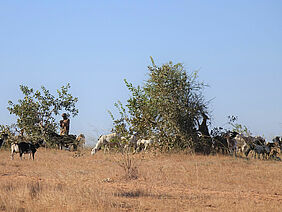"Systematic integration of crops, shrubs and livestock (CSL) together with organic and conservation agriculture practices have significant potential to enhance soils, yields and build resilience. Such practices include mulching crop residues and reduced tillage", Harun Cicek of FiBL and Coordinator of SustainSahel explains. "For dryland regions such as the Sahel, which provide food for millions of people, significant yield increases between 100 and 800% are achievable by introducing, for example, woody perennials in arable fields to improve soil and water availability."
Seven focus areas in three different countries
Working in partnership with farmer organisations, advisory services and farming communities, SustainSahel will build on existing knowledge and related projects, for example ORM4Soil. SustainSahel established seven project focus areas in Senegal, Burkina Faso, and Mali. Additionally, in each focus area Innovation Platforms will be formed with the local actors involved with milk, meat, grain, cotton and other regional value chains. The platforms are maintained to develop into a structural nucleus of the created living labs. This approach is a systematic and integrative process of dialogues among the stakeholders and project researchers in developing systems of crops integrated with shrubs and livestock. Through the duration of the project, existing know-how will be tested, and novel practices will be encouraged to emerge.
Women for leadership roles
Women are shaping the Western Sahel and savannah production systems to a great extent and are key to ensuring that the SustainSahel project not only generates the new knowledge needed for transformation but also have a significant role in ensuring that knowledge is utilised. Women will take leadership roles in demonstration and piloting activities, workshops and focus groups. The farmer-to-farmer training videos to be produced in the project will help narrow the knowledge gap between men and women as well as between youth and elders.
"The project’s overall aim is to boost the resilience and sustainable intensification potential of agricultural production systems in West Africa," concludes Harun Cicek, "and support fruitful cooperation across the Sahel as well as between African and European institutions."
Many Sustainability Development Goals of the UN are addressed
The 5-year project is designed to contribute to achieving many of the UN’s Sustainability Development Goals (SDGs) - SDGs 2, 13 & 15 by developing and supporting the implementation of practices that improve soil water capture/holding capacity and organic matter content; increase productivity through optimised crops, shrubs, livestock integration and climate mitigation. SDGs 1, 5, 16 & 17 will also be addressed through capacity and partnership development, networking and a multi-actor approach enhancing the conditions for innovation.
This news item was adapted from the SustainSahel Press Release created on the 8th of March 2021. It is available for download here: Harun Cicek
Links
- fibl.org: Project description SustainSahel
- fibl.org: Project description ORM4Soil
- sustainsahel.net: Homepage







